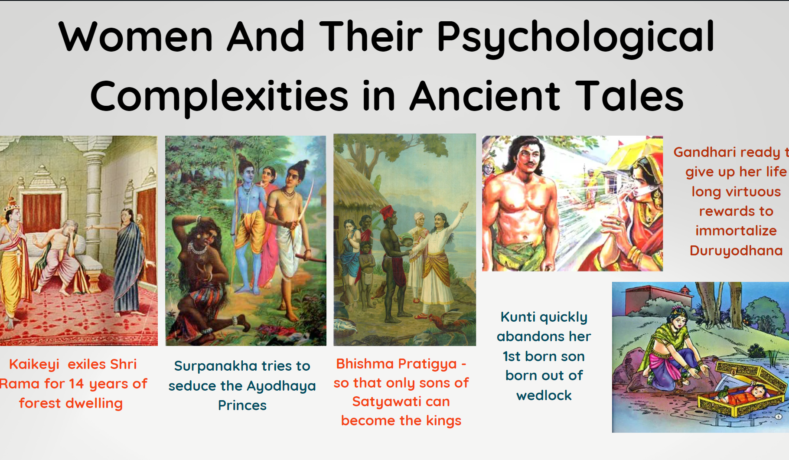Women And Their Psychological Complexities in Ancient Tales
Introduction
The ancient religious texts of various cultures have always been a subject of fascination for historians, scholars, and devotees alike. These texts are replete with stories of individuals from diverse backgrounds, each dealing with their own set of complexities and challenges. Within these narratives, women characters, just like their male counterparts, exhibit a wide range of traits and experiences. Let us explore some examples of women from revered religious texts who were born into privilege but found themselves facing personal struggles and exhibiting human flaws.
-
Kaikeyi – The Ambitious Queen
Kaikeyi, the third queen of King Dasharatha, was known for her intelligence and ambition. However, her story took a tragic turn when she allowed herself to be swayed by greed and the manipulations of an illiterate maid, Manthara. Manthara’s cunning led Kaikeyi to demand that her own son, Bharata, be made the king instead of her stepson, Shri Rama. This decision had severe consequences, as Shri Rama, accompanied by his devoted wife Sita, was exiled to the forest for fourteen years. Kaikeyi’s actions, driven by her ambition, led to the suffering of both her stepsons and her co-queens, Kausalya and Sumitra.
-
Surpanakha – The Demon Princess
Surpanakha, the demon princess and sister of Ravana, found herself desiring Shri Rama and sought to have him for herself. Her promiscuous and libidinous nature caused a series of events that affected the lives of innocent individuals. Despite Agni Pariksha, a test of purity by fire, Sita had to undergo exile once again due to rumors and gossip that tarnished her character. As a responsible king, Shri Rama made the difficult decision to send Sita away to protect her from humiliation. The suffering caused by Surpanakha’s actions affected Shri Rama, Sita, and their children, Luv and Kush.
-
Satyawati – The Ambitious Fisherwoman
Satyawati, an illiterate but ambitious tribal fisherwoman, managed to marry King Shantanu. Her actions led to the denial of the throne to Shantanu’s valiant son, Bhishma, born of his former wife, Ganga. The ensuing conflict between the Kauravas and Pandavas in the Mahabharata was a result of the decisions made by Satyawati. She also had an affair with Rishi Parashar and gave birth to their illegitimate child, Ved Vyas.
-
Gandhari – The Chaste but Blindly Devoted Mother
Gandhari was known for her unwavering chastity and devotion to her sons, the Kauravas, even when they engaged in heinous acts. Her love for them blinded her to their tyrannical behavior, even as they attempted to disrobe the Pandava queen, Draupadi, publicly. Gandhari’s attachment to her sons caused her to lose sight of their misdeeds, leading to devastating consequences during the Kurukshetra War.
-
Kunti – The Impulsive Princess
Kunti, the princess blessed with the power to call upon demigods, impulsively tested her boon before her marriage and gave birth to Karna. Fearing the societal stigma of being an unwed mother, she decided to abandon Karna, resulting in his lifelong struggle with identity and acceptance.
Conclusion
The examples cited from revered religious texts provide us with a glimpse of the complexities and flaws of the human psyche, irrespective of gender. These stories remind us that human behavior is not solely determined by gender, but rather by individual choices and circumstances. They also caution us against hasty judgments and emphasize the importance of understanding the multidimensional nature of characters in ancient tales. By learning from their stories, we can gain insight into the complexities of the human condition and strive for personal growth and understanding.














Leave a comment